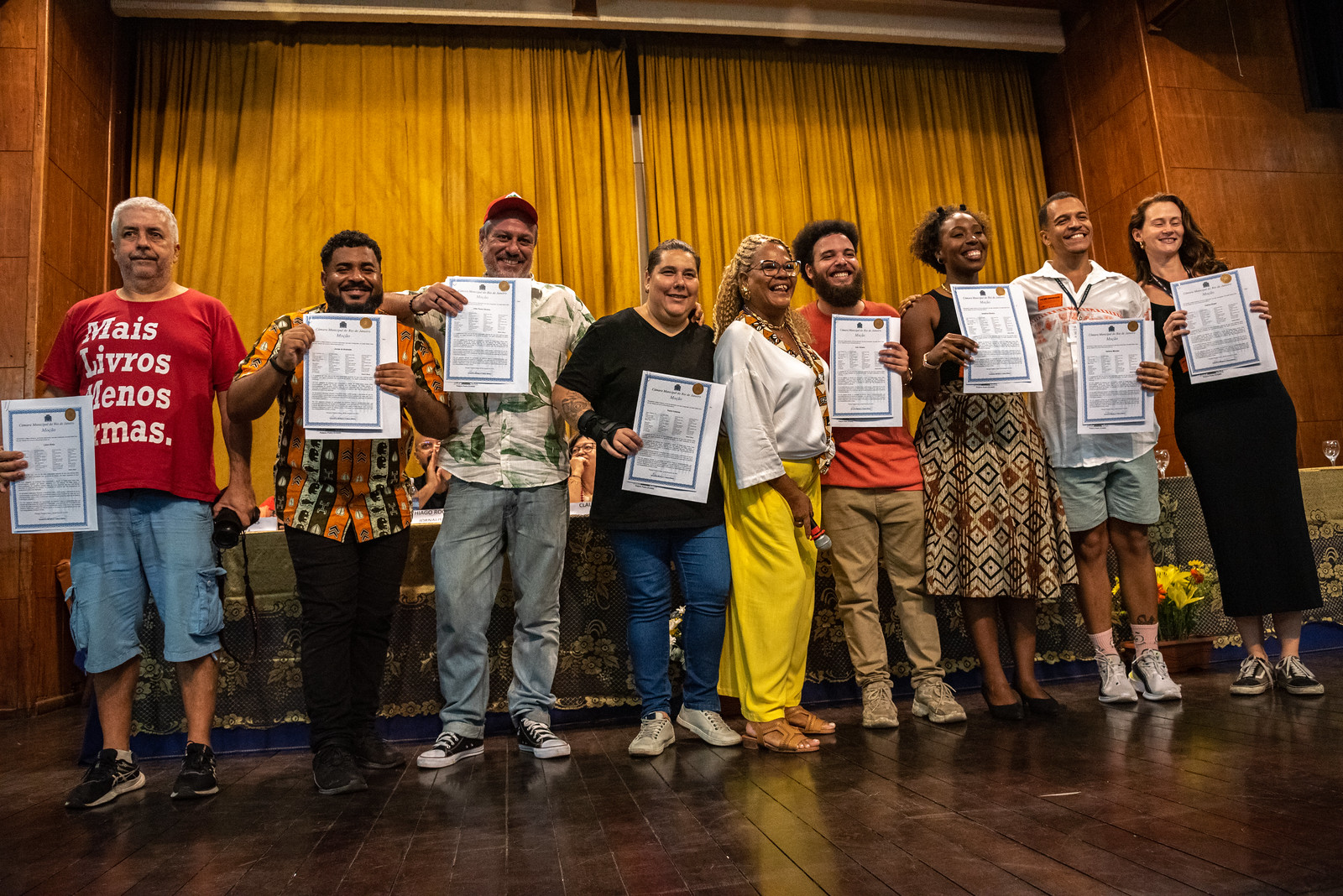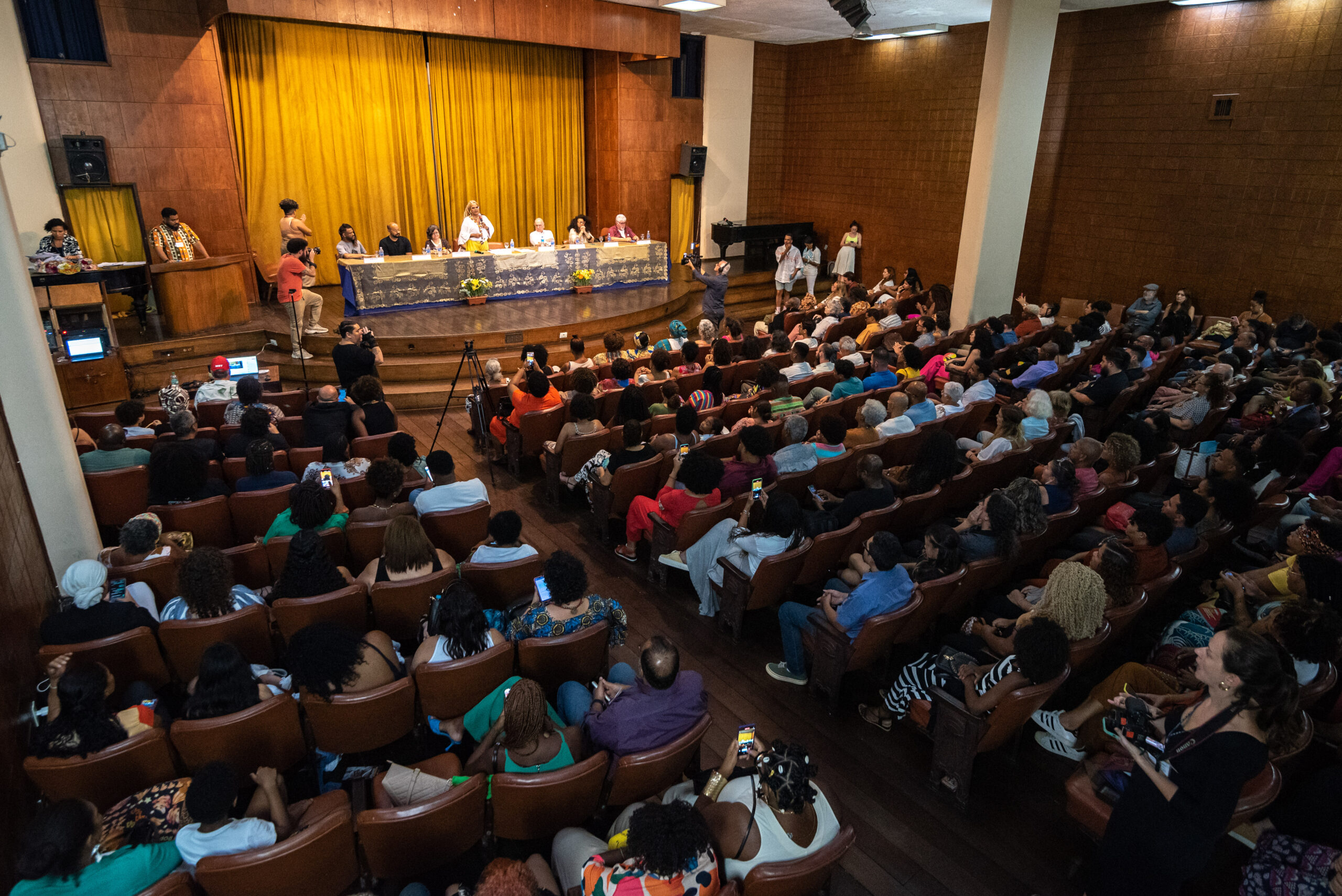
Clique aqui para Português
On a historic evening during Brazilian Black Awareness Month, on November 27, Rio de Janeiro’s City Council, through the Special Commission to Combat Racism, chaired by Councilmember Mônica Cunha, delivered motions of praise and recognition to over 160 anti-racist communicators from Rio de Janeiro, at the Brazilian Press Association (ABI), in Centro. The honorees were alternative media collectives, journalists, actors, local leaders, influencers, and anti-racist content producers. The event was held on the last Monday of Black November, the last Exu day of the month, when the orixá of communication, known as the mouth of the world in religions of African origin, is celebrated.
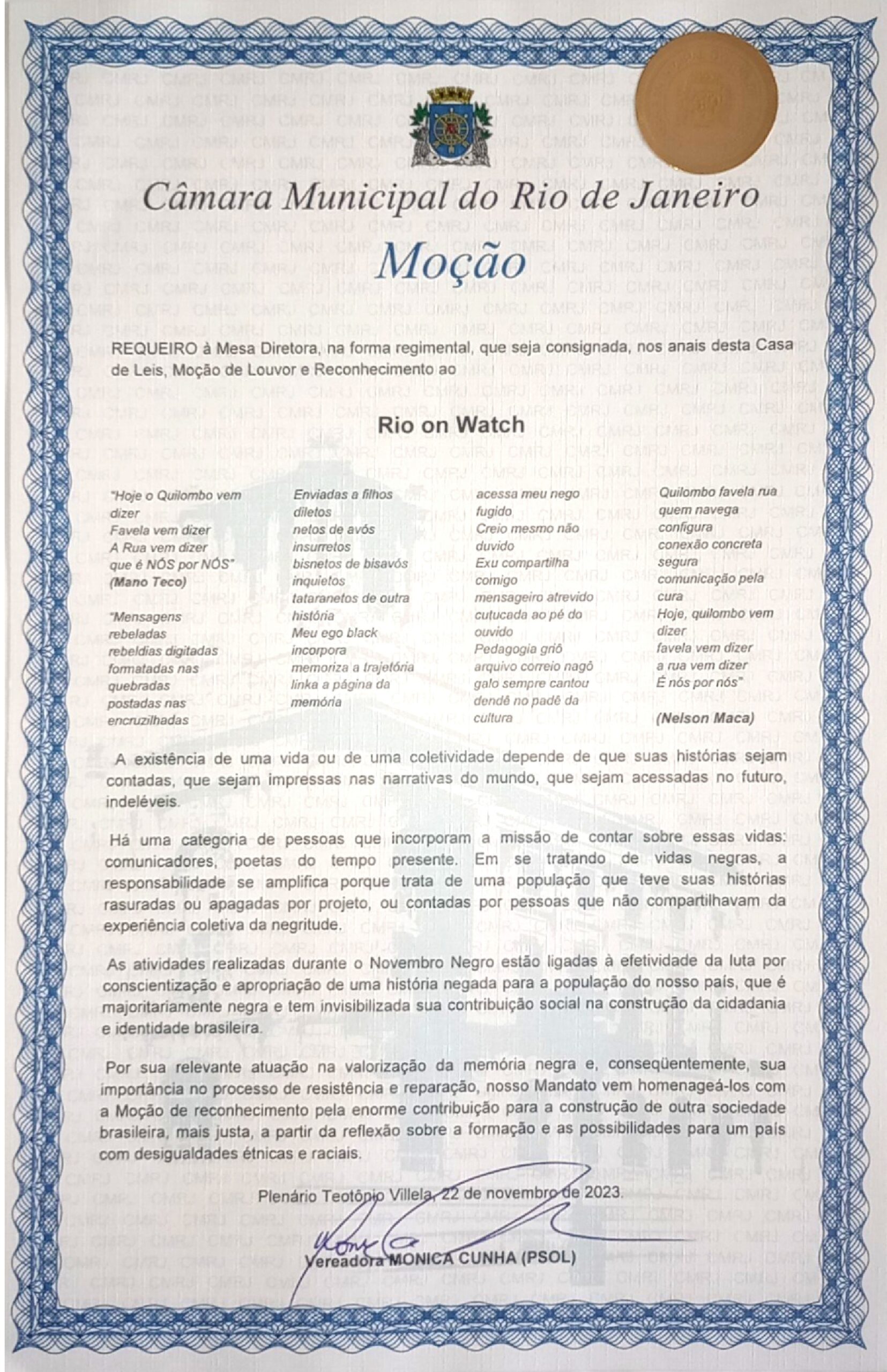
RioOnWatch received two motions: one that recognizes RioOnWatch itself as a portal for favela narratives; and another one for the series Rooting Anti-Racism in the Favelas: Deconstructing Social Narratives about Racism in Rio de Janeiro. The motions recognize the work of the news site and its network of over 80 communicators, most of whom are Black and favela residents.
Aquilombamento in the Brazilian Press Association
On the evening of November 27, the Brazilian Press Association (ABI) auditorium in downtown Rio de Janeiro was packed in celebration of grassroots, anti-racist, and favela media producers. At the panel table, special honorees included Complexo da Maré journalist and human rights activist Gizele Martins; Claudia Santiago, journalist and founder of the Piratininga Communications Nucleus (NPC); Xico Texeira, journalist and vice-president of the ABI; Tiago Rogero, journalist and screenwriter, creator and coordinator of Projeto Querino; Rene Silva, founder of Voz das Comunidades, from Complexo do Alemão; and Fátima Lima, professor at the Federal University of Rio de Janeiro (UFRJ).
At the event’s onset, hosting councilmember Mônica Cunha highlighted the importance of the work of grassroots communicators and media outlets represented at the ceremony for the city of Rio de Janeiro and Brazilian democracy. The occasion marked a milestone in recognizing Black and favela media professionals—a celebration of their peripheral narratives, traditionally stifled and overlooked by mainstream media.
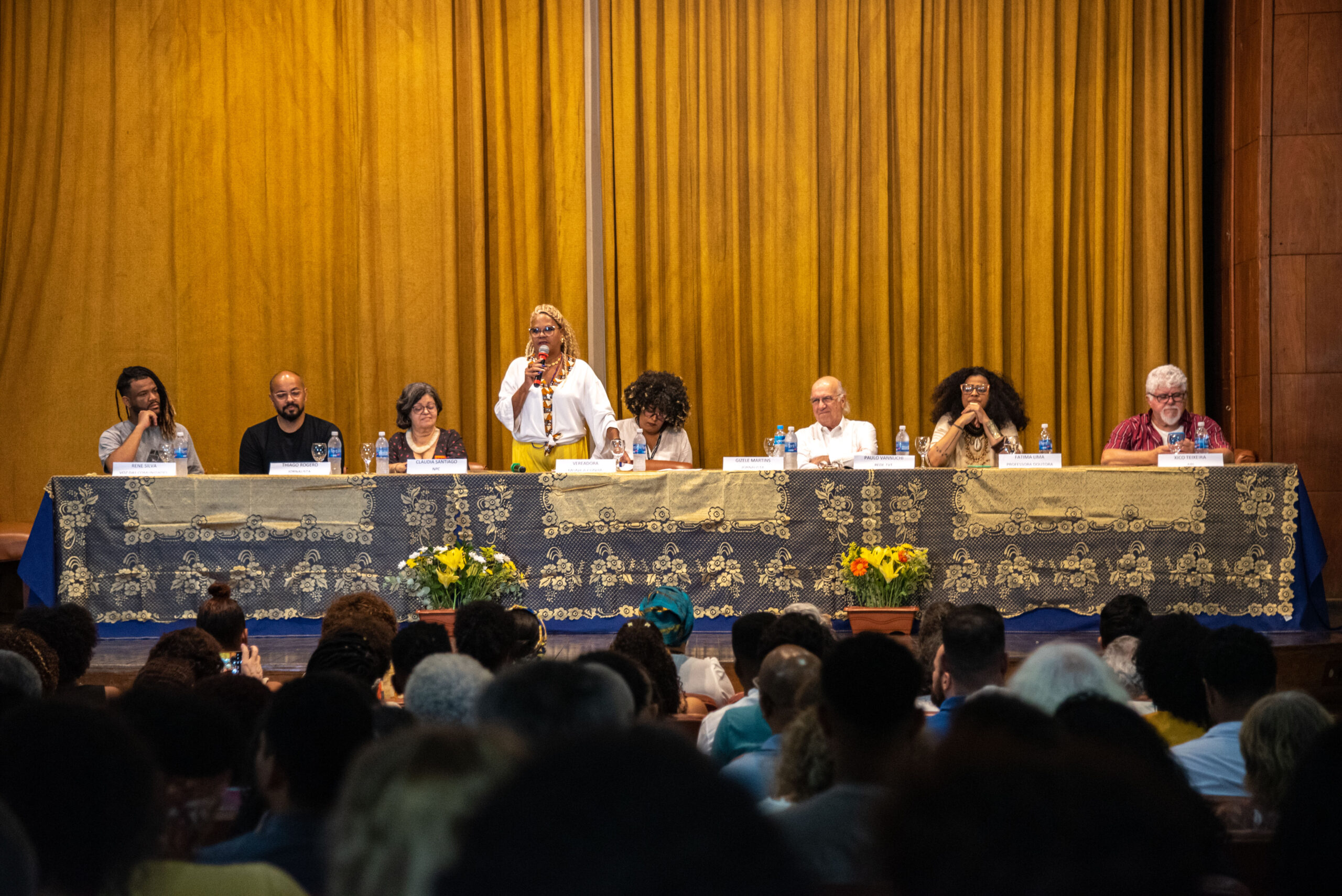
According to Mônica Cunha, the ecosystem of Rio de Janeiro’s community communication provides alternative narratives that challenge the historically constructed stereotypes perpetuated by traditional media regarding favelas, peripheries, and families and victims of State violence. She emphasized the vital role that these communicators played in her own experience as the mother of a victim of State violence. In 2006, Cunha tragically lost her son, Rafael da Silva Cunha, a 20-year-old Black man, murdered by the Rio de Janeiro Military Police (PMERJ).
“This tribute to the communicators holds profound meaning [for me] as a Black woman in this city and as a mother of a victim of violence. We know that, even with all our struggles and activism, [the State] persists in maintaining racist practices… I got to know the role of grassroots communication when I was part of a group of family members of victims [of State violence], where these outlets shared the real narrative on their websites and in their newspapers—capturing what we said and felt. [This] made all the difference to us, mothers of the victims of the State… Other media outlets consistently portrayed us as guilty, as mothers of criminals. It was the grassroots communicators who turned this page in our lives. So, today, honoring you is a declaration to the State that took my son’s life and the lives of many of my sisters’ sons: we are not mothers of criminals!” — Councilmember Mônica Cunha
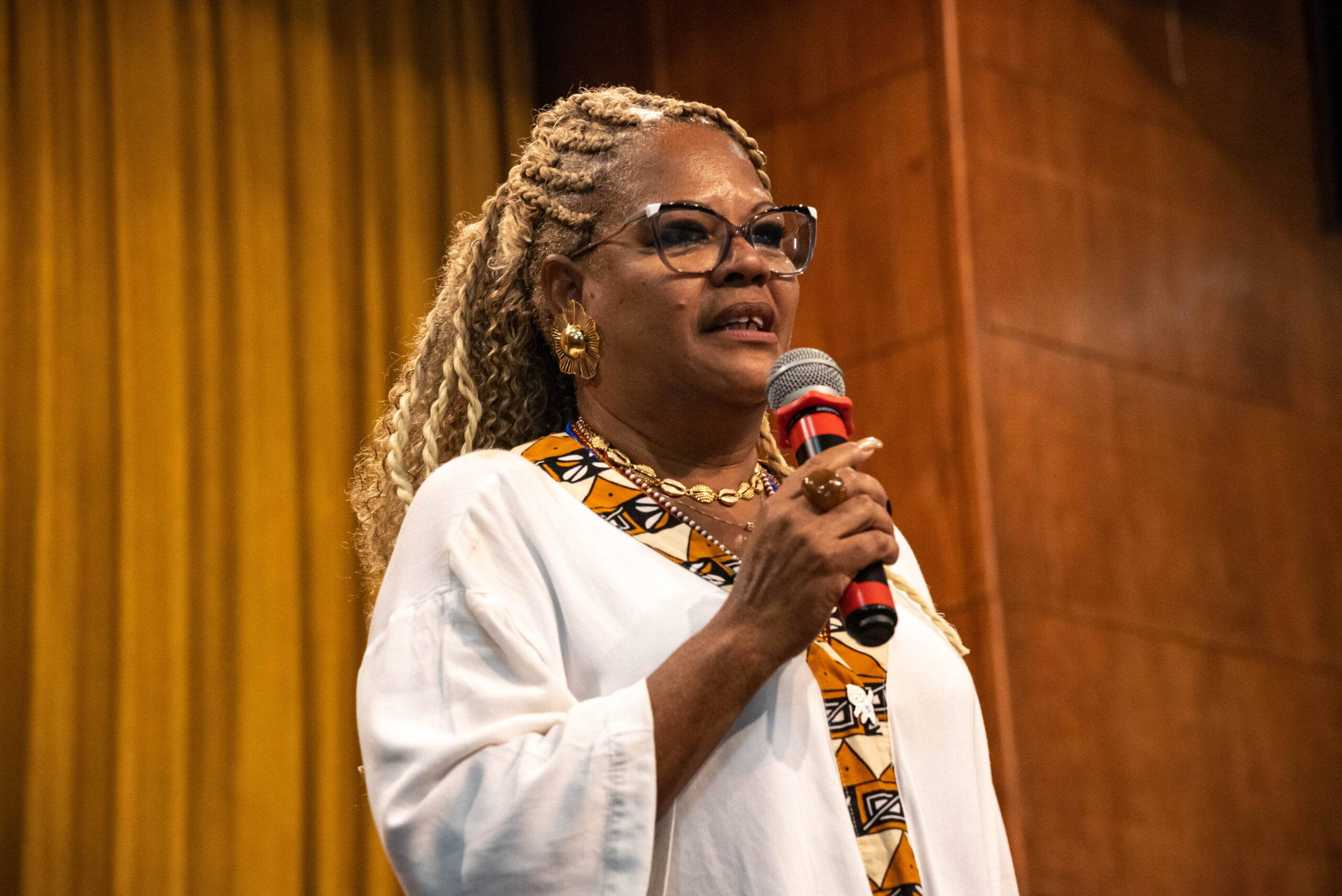
Among the over 160 honorees, the presence of Maria dos Santos Soares, better known as Dona Santinha, was particularly notable. At 99 years old, she stands as an emblematic figure in the protests of Rio de Janeiro, consistently engaged in feminist, human rights, anti-racist, and various other movements.
“My main battle is for Black people due to the situation they put us in, but my activism is for humanity. I don’t know why I’m here. Maybe my life is responsible for this, because I don’t know how to be indifferent to what’s happening around me. When I see something wrong, I want to change it.” — Dona Santinha
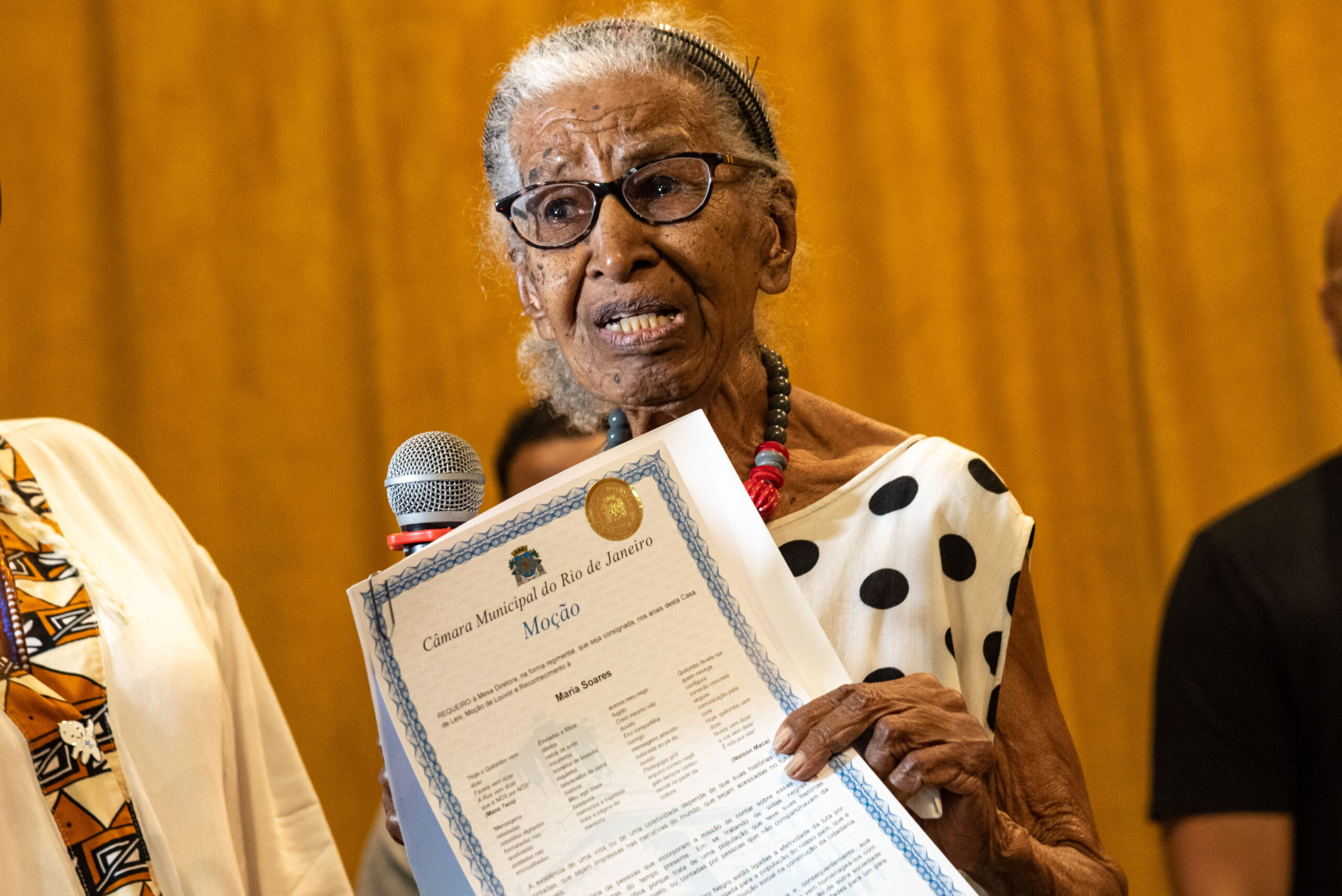
The tributes followed and numerous anti-racist projects were recognized. Among them were alternative and favela outlets, such as: Fala Manguinhos, LabJaca, Fala Roça, Coletivo Fala Akari, Portal Favelas, Redes da Maré, ANF, Notícia Preta, Alma Preta Jornalismo, Mundo Negro, Diáspora Black, Bem TV, Influência Negra, Gênero e Número and Mídia Ninja. Civil society organizations, anti-racist leaders and NGOs also received motions, such as Jurema Constâncio from the Shangri-Lá Housing Cooperative in Taquara, in Rio’s West Zone and member of the National Union for Popular Housing (UNMP); and the Marielle Franco Institute and its executive director Lígia Batista.
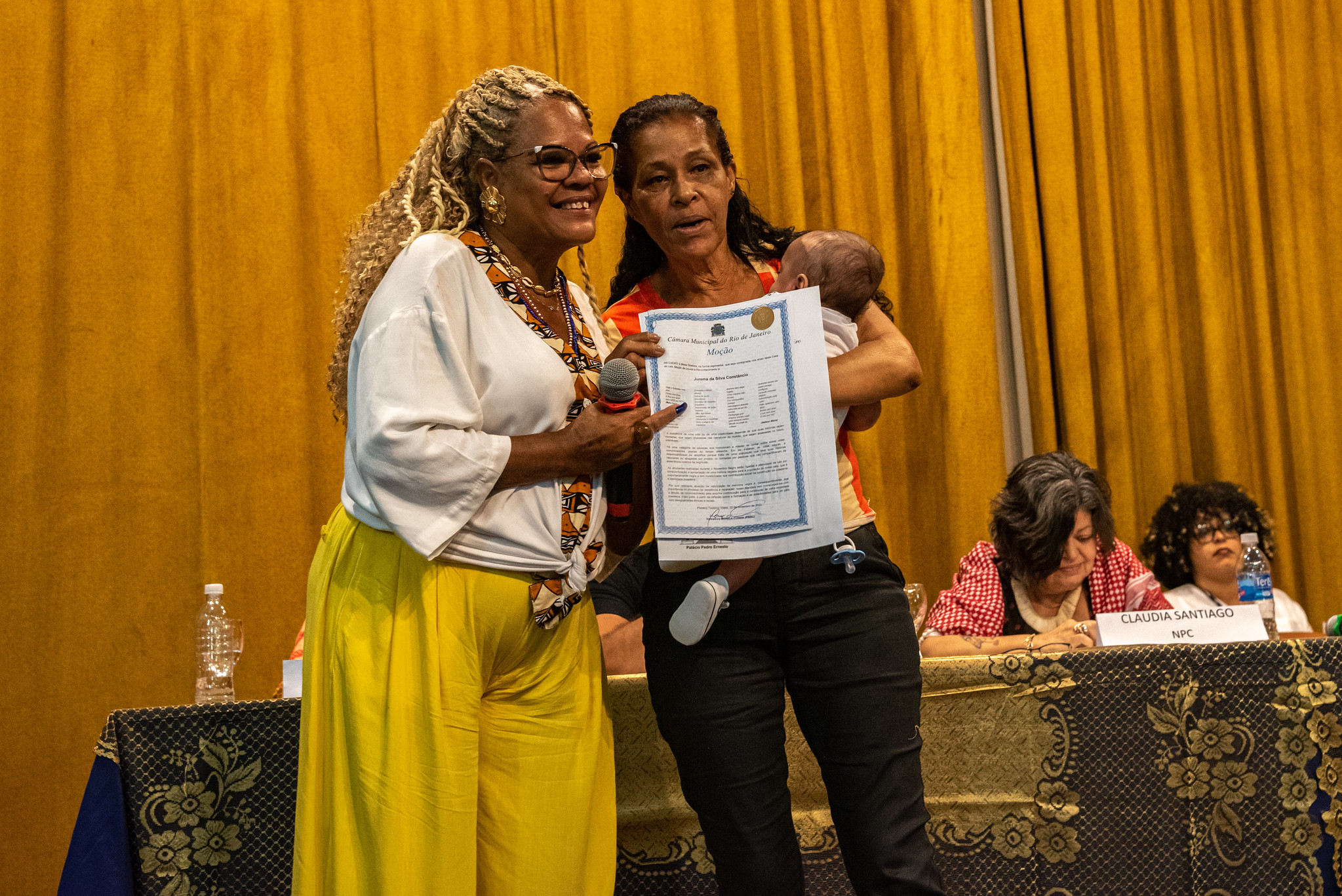
Similarly, several anti-racist professionals were recognized, including actor Jonathan Azevedo, SportTV journalist Marcos Valentim, RJTV journalist and former Voz das Comunidades reporter Vitória Henrique, playwright Jonathan Raymundo, journalist and actor Adalberto Neto, and Complexo da Maré influencer Raphael Vicente, among other influential Black figures in the fight against racism.
On this same evening, numerous grassroots photographers were honored, with many hailing from Complexo da Maré, members of the Maré Popular Photography School—a crucial and pioneering training center in dismantling stereotypes and visual narratives of violence associated with favelas.
Between one motion delivery and the other, some powerful speeches were made by panel members.
“Firstly, [I would like to say] that I am thrilled to see Mônica Cunha, my queen, my example of struggle, here, honoring anti-racist communicators, in a space that has not often opened its doors to communicators who do not have a degree in journalism. Being in a place like this, so significant to us, finally open to anti-racist people from the periphery, from favelas and quilombos, and being honored is truly significant. Many thanks to Mônica and her team for this tribute to all communicators… Furthermore, I am very happy to be here at this wonderful table with my inspirations, my great references… Community communication sparks ideas to mobilize action, and that is the fight of the Black movement, peripheral communities, and the favela movement in Rio de Janeiro, Brazil, and the world… We must increasingly strive for a society that includes us.” — Gizele Martins
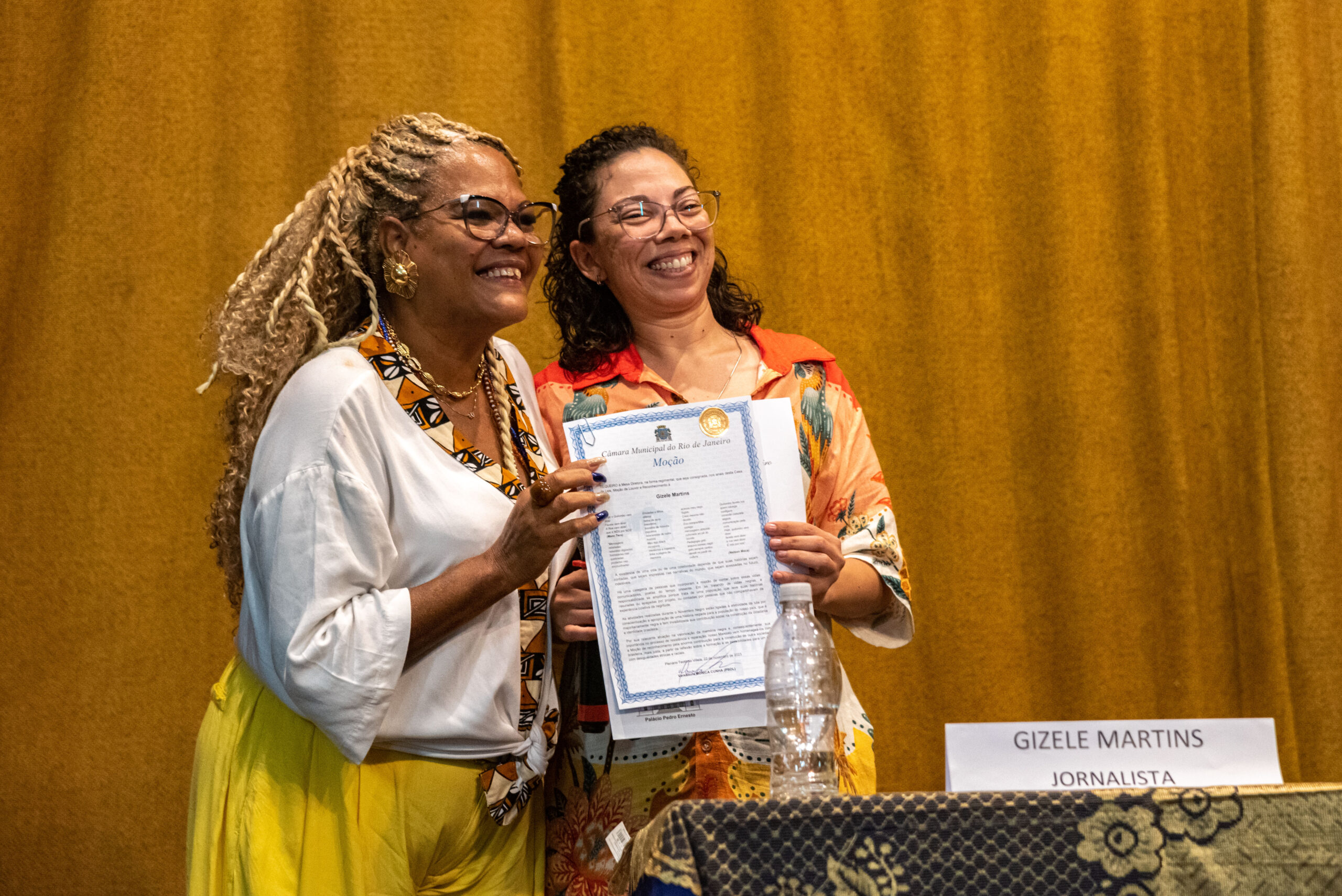
RioOnWatch Also Receives a Motion for the Project ‘Rooting Anti-Racism in the Favelas’
With the aim to promote an effective debate against racism, highlighting favela voices across Rio de Janeiro, in 2021, RioOnWatch launched the Rooting Anti-Racism in the Favelas: Deconstructing Social Narratives about Racism in Rio de Janeiro project. Through community journalism, the series focused on promoting dialogues about various topics related to race, racism, and anti-racism in the favelas of Rio de Janeiro. The central goal was to offer a comprehensive, multidimensional, and intersectional perspective, to explore how structural racism operates in Rio de Janeiro.
The purpose of the series was to encourage discussions and reflections with the aim of transforming everyday life, as racism permeates social structures, including the silences and euphemisms present in the news. Throughout 2021 and 2022, RioOnWatch published weekly articles, illustrations, videos, and podcasts, predominately produced by Black communicators living in the city’s favelas. Below, watch the closing video of the series Rooting Anti-racism in the Favelas, made by the project’s communicators, with English subtitles.
The editor of the series Rooting Anti-racism in the Favelas, present at the ceremony, analyzed the project and its achievements. He reflected on the importance of the two motions of praise and recognition and noted that they are fruit of aquilombamento, of the collective work of RioOnWatch‘s network of Afro-Brazilian and anti-racist communicators.
“The project Rooting Anti-racism in the Favelas published 55 media products… by 51 favela communicators and journalists… most of them Black and women, from 24 favelas across the metropolitan region… Every article was accompanied by original art made by local artists… The project [had already been recognized by institutions from outside the city]: the first was the silver medal at The Anthem Awards in the Diversity, Equity, and Inclusion category, as Best Local Awareness Program, and then came the Megaphone Activism Award for best Independent Media reporting.
This official and public tribute from the City Council [brings another dimension]… What strikes me the most is how long this took to happen. 135 years after the abolition of slavery and 126 years after the founding of the first favela, [it is] only when Mônica Cunha arrives at the Chamber, and even then as a substitute… that we finally have a Special Commission to Combat Racism. And even so, it is a short-term commission… [in] the city that received the most… enslaved people [in history]… How is this commission not permanent? How is anti-racism not a component of every one of the City’s policies? We need to multiply this type of initiative.” — Julio Santos Filho
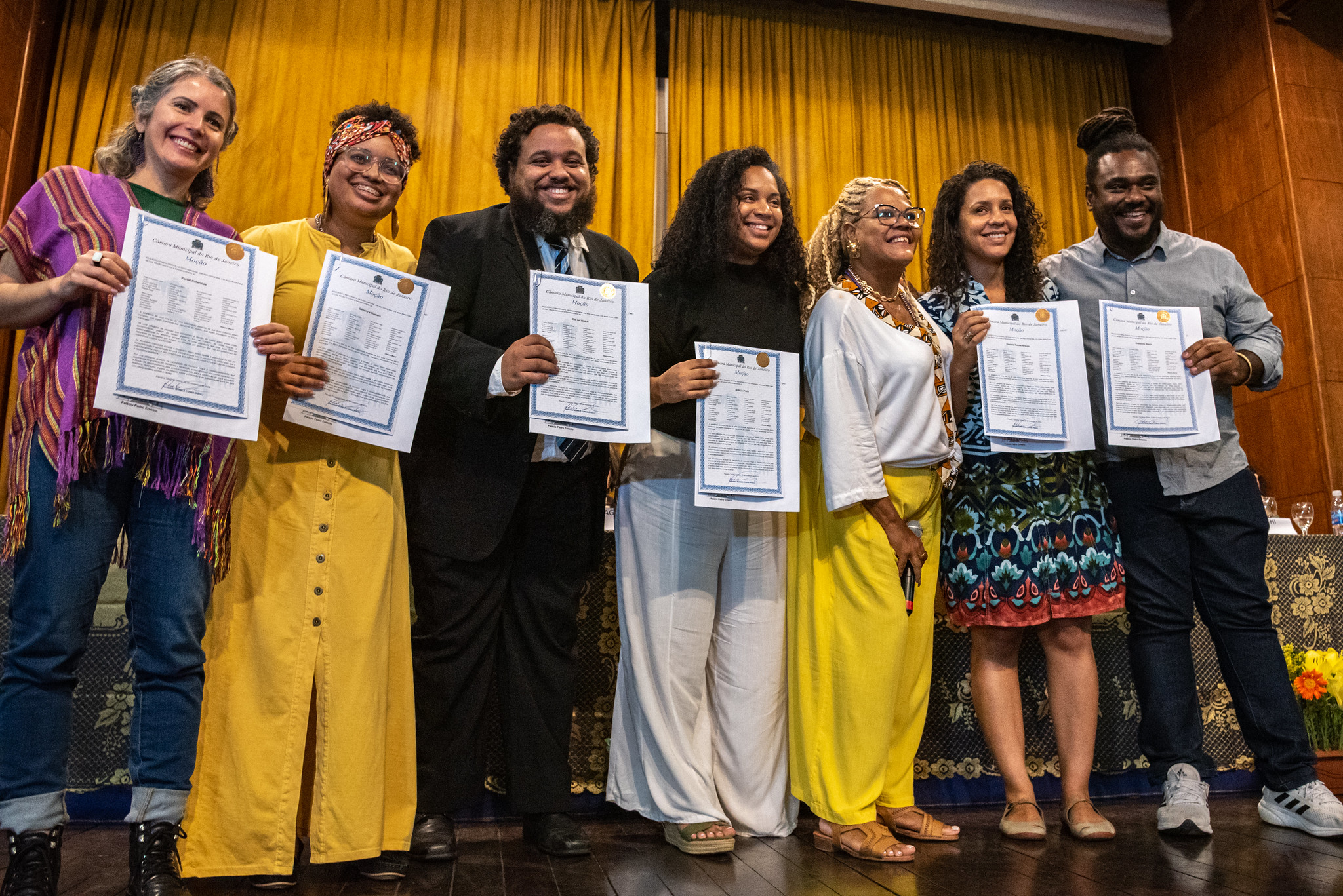
This unprecedented evening only emphasized the significance of honoring and acknowledging the voices, collective endeavors, and contributions of alternative and community media, collectives, favela leaders, journalists, grassroots communicators, and public figures at the forefront of the anti-racist struggle.
This Motion of Praise and Recognition belongs to each and every one of the communicators who built this editorial aquilombamento on RioOnWatch:
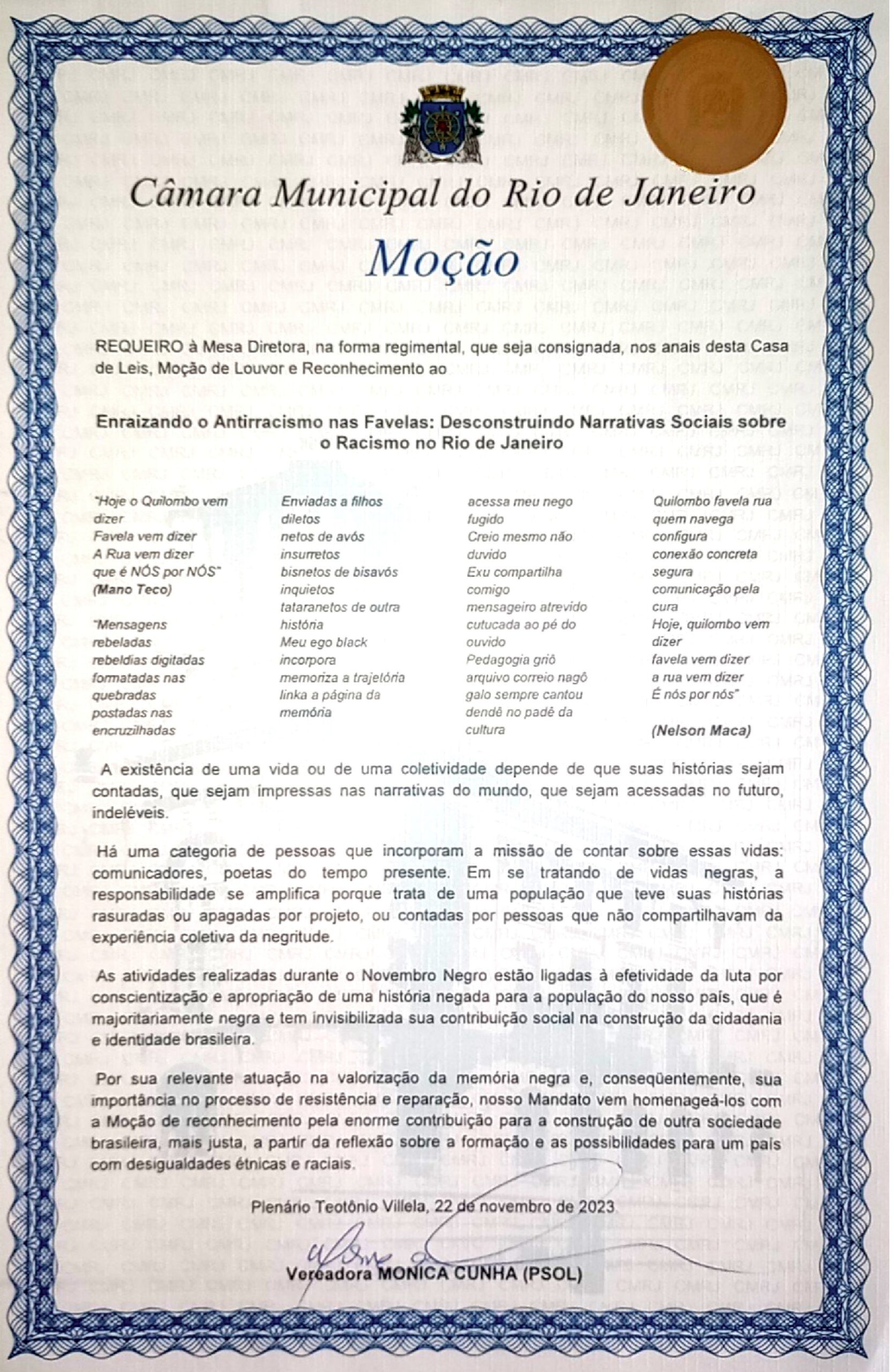
- Alexandre Cerqueira
- Amanda Botelho
- Andreia Meireles de Souza
- Anielle Franco
- Anna Paula Azevedo Pereira Rodrigues
- Antonio Alonso
- Artur Vinicius Amaro
- Beatriz Carvalho
- Camila Fiuza
- Carolina Santos
- Clara Simas Ferraz
- Cleyton Santana
- Cynthia Lima
- David Amen
- Douglas Dobby
- Eloanah Conceição
- Emerson Caetano
- Emerson de Souza
- Emilia Maria de Souza
- Estevão Ribeiro
- Euro Mascarenhas Filho
- Fabio Leon
- Felipe Bellido
- Gabriela Anastácia
- Gisele Moura Camargo
- Gizele Martins
- Gracilene Firmino
- Guilhermina Augusti
- Iamni Jager
- Ingra Maciel
- Jaqueline Suarez
- Jeferson Rodrigues
- Jônatas Ariel
- Juliana Pinho
- Julio Santos Filho
- Kelly Géssica
- Lorena Portela
- Luan Nascimento
- Natalia de Souza Flores
- Nathanael Araujo
- Neuza Nascimento
- Nyl de Souza
- Paula Pinto
- Paulo Gabriel dos Santos
- Rafael Lopes
- Raquel Batista
- Sabrina Martina
- Saulo Nicolai
- Tatiana Lima
- Victor Morais de Oliveira
- Victória Henrique
- Yara Santos
Don’t miss the album of the Ceremony of Delivery of Motions of Praise and Recognition to the Anti-Racist Communicators of Rio de Janeiro on Flickr:
About the author and photographer: Bárbara Dias was born and raised in Bangu, in Rio’s West Zone. She has a degree in Biological Sciences, a master’s in Environmental Education, and has been a public school teacher since 2006. She is a photojournalist and also works with documentary photography. She is a popular communicator for Núcleo Piratininga de Comunicação (NPC) and co-founder of Coletivo Fotoguerrilha.

